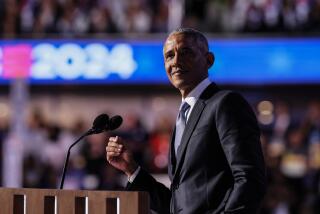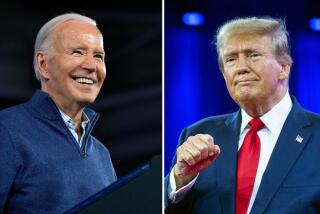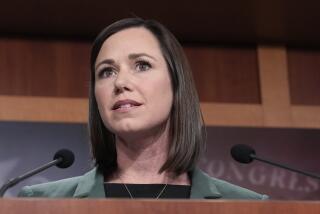Obama keeps heat on reform agenda
WASHINGTON — With signs that the worst of the recession may have passed, President Obama is trying to keep the nation focused on a still-troubled economy and regain momentum in Congress for his plan to revamp healthcare, energy, education and financial regulation -- thorny issues that have long defied solution.
“By no means are we out of the woods just yet,” Obama said in what amounted to an economic State of the Union address Tuesday.
The worst economic crisis since the Great Depression grew out of “a perfect storm of irresponsibility and poor decision-making,” he said, and “we cannot rebuild this economy on the same pile of sand.”
Already facing push-back in Congress on his overall economic strategy, Obama was effectively laying down a marker: He will fight for his ambitious agenda and argue that his opponents are putting long-term recovery at risk.
Congress is out on holiday recess until next week, so there was little immediate reaction to Obama’s warning shot for Capitol Hill. But Senate Budget Committee Chairman Kent Conrad (D-N.D.) offered a foretaste of just how uncertain many lawmakers -- even Obama’s allies -- are about accomplishing all that the president seeks.
“It is hard to do everything that needs to be done,” said Conrad, whose committee has struggled to draft a budget blueprint that at least pays homage to Obama’s views. “You do have to prioritize.”
Obama’s 45-minute speech, delivered before an audience at Georgetown University, came at a crucial moment for the White House.
Although most experts see more job losses and hardship ahead, and a long road to recovery even after the economy begins to mend, recent signs that the crisis could be bottoming out threaten to relieve the pressure on Congress to act on Obama’s agenda.
Powerful interest groups, for example, are prepared to fight his plan to tighten government oversight of the financial system, as well as challenge his ideas for restructuring the economy through action on healthcare, energy and student-loan policy.
They can point to such positive signs as Tuesday’s comments by personal computer chip maker Intel Corp.’s chief executive, Paul Otellini. “We are seeing signs that the bottom of the PC market segment has been reached. I believe the worst is now behind us,” he told analysts in a conference call.
Still, a Commerce Department report Tuesday showed that retail sales in March dropped a sharp 1.1%, demonstrating that the economy continues to be in critical condition.
If the crisis atmosphere abates, White House strategists fear, Washington could drift back toward the partisan stalemate that has prevented action on these key issues in the past. By linking them to the economic crisis and warning that prosperity is not just around the corner, Obama hopes to keep the pressure on.
“The economic crisis opens the door for the president to secure regulatory reforms that otherwise would be impossible politically to achieve,” said Jaret Seiberg, a financial policy analyst with the Washington Research Group.
“I think the window is closing to make significant progress on these initiatives, because once we start to recover, there’s going to be less momentum to get it done quickly and the special interests are going to have more power to modify the plans,” he said.
Against that backdrop, Obama sought to blunt the criticism and maintain a sense of urgency about attacking the recession. While President Franklin D. Roosevelt tried to soothe anxiety during the Great Depression by telling the nation “the only thing we have to fear is fear itself,” Obama tried to keep some fear alive.
Addressing his critics head-on, the president defended his economic strategy as a prudent, middle-of-the-road course that focused on helping average Americans. But he acknowledged that continual bailouts of banks and financial institutions, such as insurance giant American International Group, appeared to be rewarding the very people who helped cause the crisis.
“One of my most frequent questions in the letters that I get from constituents is ‘Where’s my bailout?,’ and I understand the sentiment,” Obama said. “It makes sense intuitively, and morally it makes sense, but the truth is that a dollar of capital in a bank can actually result in $8 or $10 of loans to families and businesses.
“So that’s a multiplier effect that can ultimately lead to a faster pace of economic growth. That’s why we have to fix the banks.”
Sounding like the former college professor he is, Obama used much of the speech to explain his view of the causes of the crisis. But throughout his version of Recession 101, Obama continued to point to the vital work needed to make a recovery take hold.
“The market will continue to rise and fall. Credit is still not flowing nearly as easily as it should. The process for restructuring AIG and the auto companies will involve difficult and sometimes unpopular choices,” Obama said.
As if to underscore his point, the Dow Jones index of 30 blue-chip stocks fell 137.63 points to 7,920.18.
“And all of this means that there is much more work to be done. But all of this also means that you can continue to expect an unrelenting, unyielding, day-by-day effort from this administration to fight for economic recovery on all fronts,” Obama said.
The speech came as a CNN poll released Tuesday showed that 58% of respondents think Obama has a clear plan for solving the country’s economic problems.
At least some congressional leaders share the president’s view that Democrats should seize the moment and take advantage of the president’s political capital.
“Washington is, shall we say, a very perishable town,” House Speaker Nancy Pelosi (D-San Francisco) told reporters recently. “If you have an opportunity, you should seize it. Otherwise, it might not be there. And the forces of the status quo are mighty, and they have deep pockets and they can wait you out.”
House Minority Leader John A. Boehner (R-Ohio) is one who would rather see the president’s efforts stymied. He said Tuesday that the huge price tag for some of Obama’s initiatives would stifle economic growth, not foster it.
“Our economy will improve -- but it will be because of the ingenuity and hard work of American workers and small businesses, not because of the Washington Democrats’ misguided policies that rely on recklessly spending taxpayer dollars,” Boehner said.
The administration’s top economic officials have been sounding notes of optimism recently, buoyed by a surge in financial markets and some improving economic indicators. There have been encouraging data on home sales, home building and business inventories, though the signals have been mixed.
In his speech, Obama acknowledged the encouraging signs, declaring that the “extraordinary action” of his administration in its first three months had contributed to those glimmers of hope. Among the actions was the $787-billion economic stimulus legislation, which he said had helped spur consumer demand and restore some flow of credit that’s vital to businesses.
Ethan Harris, co-head of economic research at Barclays Capital, said the stimulus spending would slow the economy’s plummet, but he still expected a 2% to 3% decline in economic growth in the second quarter.
Unlike most recessions, which end with a strong surge in demand and growth, this one is more likely to give way to a slow recovery as the economy continues to suffer from a shellshocked financial sector, Harris said. That’s why he believes it is crucial that government spending from the stimulus program extends well into next year.
“It’s not just a matter of stopping the recession,” he said. “We have to keep pushing in the months after the recovery begins to restore normal growth.”
Tuesday’s report of a sharp drop in March retail sales underlined Obama’s perilous position.
In a speech Tuesday in Atlanta, Federal Reserve Chairman Ben S. Bernanke said there had been recent “tentative signs that the sharp decline in economic activity may be slowing.” But he added, “We will not have a sustainable recovery without a stabilization of our financial system and credit markets.”
Obama tried to drive home his point about economic reforms by using a parable from Jesus’ Sermon on the Mount about a man who builds a house on sand, only to see it destroyed by a storm. Another man’s house survives because it is built on a rock.
“We cannot rebuild this economy on the same pile of sand. We must build our house upon a rock,” Obama said. “We must lay a new foundation for growth and prosperity -- a foundation that will move us from an era of borrow and spend to one where we save and invest; where we consume less at home and send more exports abroad.”
Obama’s foundation has five pillars: new rules for banks and financial services companies; more educational spending; new investments in renewable energy and technology; healthcare reforms to lower costs; and budgetary savings to reduce the national debt.
“When a crisis hits, there’s all too often a lurch from shock to trance, with everyone responding to the tempest of the moment until the furor has died away and the media coverage has moved on, instead of confronting the major challenges that will shape our future in a sustained and focused way,” Obama said.
“This can’t be one of those times. The challenges are too great; the stakes are too high.”
--
mdoneal@tribune.com
Times staff writer Janet Hook contributed to this report.
--
(BEGIN TEXT OF INFOBOX)
Obama’s ‘5 pillars’ proposals
The key to a bright, sustainable future for the U.S. economy, President Obama said, is a “foundation built upon five pillars,” each of which represents a massive policy shift that is sure to set off a major political battle. His proposals:
* New rules for Wall Street
Fundamentally rewrite financial regulations to “reward drive and innovation, not reckless risk-taking” and give government the authority to monitor institutions that could pose “systemic” risk to the whole system if they get into trouble. Obama called for legislation by year-end.
* Investment in education
Focus on boosting early childhood education, improving test scores and providing tax credits to make a college education more affordable.
* Investment in renewable energy and technology
Ratchet up the stimulus bill’s spending on energy technology and “green” public works that will safeguard the environment and reduce dependence on foreign oil while generating thousands of jobs for U.S. workers.
* Healthcare reform
Revamp the healthcare system to improve quality and make medical care more affordable for every American without increasing the federal deficit.
* Deficit reduction
Root out waste and redundancy, as well as contain healthcare and other entitlement costs.
-- Michael Oneal
More to Read
Get the L.A. Times Politics newsletter
Deeply reported insights into legislation, politics and policy from Sacramento, Washington and beyond. In your inbox three times per week.
You may occasionally receive promotional content from the Los Angeles Times.











